Você conhece a HISTÓRIA DA LÍNGUA INGLESA? | Prof. Newton Rocha – Inglês Por Skype #dicasdeinglês
Você conhece a HISTÓRIA DA LÍNGUA INGLESA? | Prof. Newton Rocha – Inglês Por Skype #dicasdeinglês
Hello, everyone!
Hoje vamos conhecer a HISTÓRIA DA LÍNGUA INGLESA! Leia abaixo em inglês, caso tenha dúvida, a tradução está logo abaixo!
Um grande abraço do Prof. Newton Rocha!
Entre em contato e faça uma AULA EXPERIMENTAL GRATUITA!
Para aulas de Inglês Individuais por Skype e fazer UMA AULA EXPERIMENTAL GRATUITA, basta entrar em contato no prof.newtonrocha@gmail.com ou no whatsapp (31) 9143-7388. PREÇOS ACESSÍVEIS!
Visite o nosso Blog Melhore Seu Inglês:
https://melhoreseuingles.wordpress.com/
https://melhoreseuingles.wordpress.com/
Curta Nossa página no Facebook:
https://goo.gl/qcPQUK
https://goo.gl/qcPQUK
Nosso Canal no Youtube – Melhore Seu Inglês:
https://goo.gl/KYns5i
https://goo.gl/KYns5i
History of English
The history of the English language really started with the arrival of three Germanic tribes who invaded Britain during the 5th century AD. These tribes, the Angles, the Saxons and the Jutes, crossed the North Sea from what today is Denmark and northern Germany. At that time the inhabitants of Britain spoke a Celtic language. But most of the Celtic speakers were pushed west and north by the invaders – mainly into what is now Wales, Scotland and Ireland. The Angles came from “Englaland” [sic] and their language was called “Englisc” – from which the words “England” and “English” are derived.
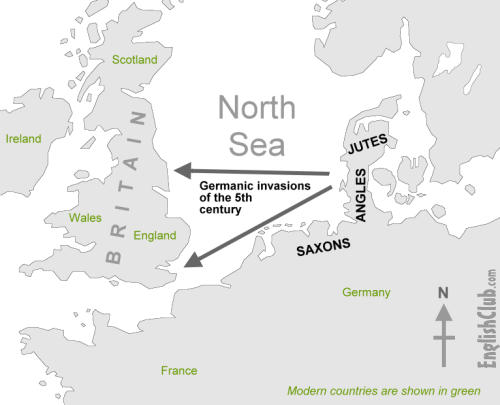
Germanic invaders entered Britain on the east and south coasts in the 5th century
Old English (450-1100 AD)
The invading Germanic tribes spoke similar languages, which in Britain developed into what we now call Old English. Old English did not sound or look like English today. Native English speakers now would have great difficulty understanding Old English. Nevertheless, about half of the most commonly used words in Modern English have Old English roots. The words be, strong and water, for example, derive from Old English. Old English was spoken until around 1100.
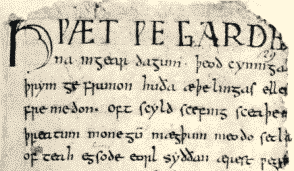
Part of Beowulf, a poem written in Old English
Middle English (1100-1500)
In 1066 William the Conqueror, the Duke of Normandy (part of modern France), invaded and conquered England. The new conquerors (called the Normans) brought with them a kind of French, which became the language of the Royal Court, and the ruling and business classes. For a period there was a kind of linguistic class division, where the lower classes spoke English and the upper classes spoke French. In the 14th century English became dominant in Britain again, but with many French words added. This language is called Middle English. It was the language of the great poet Chaucer (c1340-1400), but it would still be difficult for native English speakers to understand today.

An example of Middle English by Chaucer
Modern English
Early Modern English (1500-1800)
Towards the end of Middle English, a sudden and distinct change in pronunciation (the Great Vowel Shift) started, with vowels being pronounced shorter and shorter. From the 16th century the British had contact with many peoples from around the world.
This, and the Renaissance of Classical learning, meant that many new words and phrases entered the language. The invention of printing also meant that there was now a common language in print. Books became cheaper and more people learned to read. Printing also brought standardization to English. Spelling and grammar became fixed, and the dialect of London, where most publishing houses were, became the standard. In 1604 the first English dictionary was published.
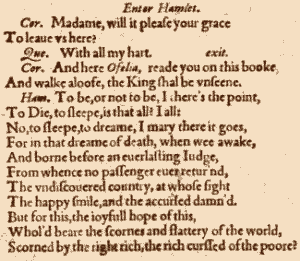
Hamlet’s famous “To be, or not to be” lines, written in Early Modern English by Shakespeare
Late Modern English (1800-Present)
The main difference between Early Modern English and Late Modern English is vocabulary. Late Modern English has many more words, arising from two principal factors: firstly, the Industrial Revolution and technology created a need for new words; secondly, the British Empire at its height covered one quarter of the earth’s surface, and the English language adopted foreign words from many countries.
Varieties of English
From around 1600, the English colonization of North America resulted in the creation of a distinct American variety of English. Some English pronunciations and words “froze” when they reached America. In some ways, American English is more like the English of Shakespeare than modern British English is. Some expressions that the British call “Americanisms” are in fact original British expressions that were preserved in the colonies while lost for a time in Britain (for example trash for rubbish, loan as a verb instead of lend, and fall for autumn; another example, frame-up, was re-imported into Britain through Hollywood gangster movies). Spanish also had an influence on American English (and subsequently British English), with words like canyon, ranch, stampede and vigilante being examples of Spanish words that entered English through the settlement of the American West. French words (through Louisiana) and West African words (through the slave trade) also influenced American English (and so, to an extent, British English).
Today, American English is particularly influential, due to the USA’s dominance of cinema, television, popular music, trade and technology (including the Internet). But there are many other varieties of English around the world, including for example Australian English, New Zealand English, Canadian English, South African English, Indian English and Caribbean English.
The Germanic Family of Languages
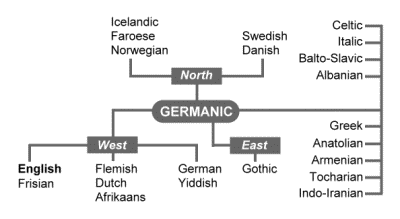
English is a member of the Germanic family of languages. Germanic is a branch of the Indo-European language family.

English is a member of the Germanic family of languages. Germanic is a branch of the Indo-European language family.
| A brief chronology of English | ||
|---|---|---|
| 55 BC | Roman invasion of Britain by Julius Caesar | Local inhabitants speak Celtish |
| AD 43 | Roman invasion and occupation. Beginning of Roman rule of Britain | |
| 436 | Roman withdrawal from Britain complete | |
| 449 | Settlement of Britain by Germanic invaders begins | |
| 450-480 | Earliest known Old English inscriptions | Old English |
| 1066 | William the Conqueror, Duke of Normandy, invades and conquers England | |
| c1150 | Earliest surviving manuscripts in Middle English | Middle English |
| 1348 | English replaces Latin as the language of instruction in most schools | |
| 1362 | English replaces French as the language of law. English is used in Parliament for the first time | |
| c1388 | Chaucer starts writing The Canterbury Tales | |
| c1400 | The Great Vowel Shift begins | |
| 1476 | William Caxton establishes the first English printing press | Early Modern English |
| 1564 | Shakespeare is born | |
| 1604 | Table Alphabeticall, the first English dictionary, is published | |
| 1607 | The first permanent English settlement in the New World (Jamestown) is established | |
| 1616 | Shakespeare dies | |
| 1623 | Shakespeare’s First Folio is published | |
| 1702 | The first daily English-language newspaper, The Daily Courant, is published in London | |
| 1755 | Samuel Johnson publishes his English dictionary | |
| 1776 | Thomas Jefferson writes the American Declaration of Independence | |
| 1782 | Britain abandons its colonies in what is later to become the USA | |
| 1828 | Webster publishes his American English dictionary | Late Modern English |
| 1922 | The British Broadcasting Corporation is founded | |
| 1928 | The Oxford English Dictionary is published | |
TRADUÇÃO
História do Inglês
A história do idioma Inglês realmente começou com a chegada de três tribos germânicas que invadiram a Grã-Bretanha durante o século 5 dC. Essas tribos, os anglos, os saxões e os jutos, atravessou o Mar do Norte a partir do que hoje é a Dinamarca e no norte da Alemanha. Nessa altura, os habitantes da Grã-Bretanha falavam uma língua celta. Mas a maioria dos alto-falantes celtas foram empurrados para o oeste e norte pelos invasores – principalmente no que é hoje Gales, Escócia e Irlanda. Os Angles veio “Englaland” [ sic ] e sua língua foi chamado de “Englisc” – a partir do qual as palavras “Inglaterra” e “Inglês” são derivadas.

invasores germânicos entraram Grã-Bretanha nas costas leste e sul no século 5
Old Inglês (450-1100 dC)
As tribos germânicas invasoras falavam línguas semelhantes, que na Grã-Bretanha desenvolveu no que hoje chamamos de Old Inglês. Inglês velho não parecia ou olhar como o Inglês hoje. Falantes nativos Inglês agora teria grande dificuldade em compreender Inglês Antigo. No entanto, cerca de metade das palavras mais usadas em Inglês Moderno têm raízes inglesas velhas. As palavras seja , forte e água , por exemplo, derivam de Old Inglês. Old Inglês foi falado até por volta de 1100.

Parte de Beowulf , um poema escrito em Inglês Antigo
Inglês médio (1100-1500)
Em 1066 William, o Conquistador, duque da Normandia (parte da França moderna), invadiram e conquistaram a Inglaterra. Os novos conquistadores (chamados os normandos) trouxeram com eles uma espécie de francês, que se tornou a língua da Corte Real, e as classes dominantes e de negócios. Por um período, houve uma espécie de divisão de classes linguística, onde as classes mais baixas falava Inglês e as classes superiores falava francês. No século 14 Inglês tornou-se dominante na Grã-Bretanha novamente, mas com muitas palavras em francês acrescentou. Esta linguagem é chamada de Inglês Médio. Era a língua do grande poeta Chaucer (c1340-1400), mas ainda assim seria difícil para falantes nativos de inglês para entender hoje.

Um exemplo de Inglês médio por Chaucer
Inglês moderno
Inglês Moderno Inicial (1500-1800)
Para o fim do Inglês Médio, uma mudança súbita e distinta de pronúncia (a Grande Vogal Shift) começou, com vogais sendo pronunciada mais curtos. A partir do século 16, o britânico teve contato com muitos povos de todo o mundo.
Isto, eo renascimento da aprendizagem clássica, significava que muitas novas palavras e frases entrou na língua. A invenção da imprensa também significava que havia agora uma linguagem comum na impressão. Livros se tornaram mais baratos e mais pessoas aprenderam a ler. A impressão também trouxe padronização para Inglês. Ortografia e gramática tornou-se fixo, eo dialeto de Londres, onde a maioria das editoras eram, tornou-se o padrão. Em 1604 o primeiro dicionário Inglês foi publicado.

de Hamlet famoso “ser ou não ser” linhas, escritas em Inglês Moderno Inicial de Shakespeare
Tarde Inglês Modern (1800-presente)
A principal diferença entre Inglês Moderno Inicial e tardia Inglês moderno é vocabulário. Tarde Modern Inglês tem muitas mais palavras, decorrente de dois fatores principais: em primeiro lugar, a Revolução Industrial e Tecnologia criou uma necessidade de novas palavras; em segundo lugar, o Império Britânico em sua altura coberto de um quarto da superfície da terra, e do idioma Inglês adotada palavras estrangeiras de muitos países.
Variedades de Inglês
Por volta de 1600, a colonização Inglês da América do Norte resultou na criação de uma variedade de Inglês Americano distinta. Alguns pronúncias de palavras em inglês e “congelou” quando chegou à América. Em alguns aspectos, Inglês Americano é mais como o Inglês de Shakespeare do que moderna Inglês britânico é. Algumas expressões que a chamada britânica “Americanismos” são de fato expressões britânicas originais que foram preservados nas colônias, enquanto perdido por um tempo na Grã-Bretanha (por exemplo, lixo de lixo, empréstimo como um verbo em vez de emprestar, e cair para o Outono; outro exemplo , frame-up , foi re-importado para a Grã-Bretanha através de filmes de gangster de Hollywood). Espanhol também tinha uma influência sobre Inglês Americano (e Inglês posteriormente britânica), com palavras como garganta , rancho , debandada e vigilante são exemplos de palavras espanholas que entraram Inglês através da colonização do Oeste americano. Palavras em francês (através da Louisiana) e palavras Oeste Africano (através do comércio de escravos) também influenciou Inglês Americano (e assim, até certo ponto, Inglês britânico).
Hoje, American Inglês é particularmente influente, devido à dominância dos EUA do cinema, televisão, música popular, comércio e tecnologia (incluindo a Internet). Mas há muitas outras variedades de Inglês em todo o mundo, incluindo, por exemplo, Inglês australiano, Nova Zelândia Inglês, Inglês canadense, South Inglês Africano, indiano Inglês e Caribe Inglês.
A família germânica de Idiomas

Inglês é um membro da família germânica de línguas. Germânica é um ramo da família de línguas indo-européia.

Inglês é um membro da família germânica de línguas. Germânica é um ramo da família de línguas indo-européia.
| Uma breve cronologia do Inglês | ||
|---|---|---|
| 55 BC | invasão romana da Grã-Bretanha por Júlio César | Locais habitantes falam Celtish |
| AD 43 | invasão romana e ocupação. A partir do domínio romano da Grã-Bretanha | |
| 436 | retirada romana da Grã-Bretanha completa | |
| 449 | Liquidação da Grã-Bretanha por invasores germânicos começa | |
| 450-480 | Primeiras inscrições ingleses velhos conhecidos | Old Inglês |
| 1066 | William, o Conquistador, duque da Normandia, invade e conquista Inglaterra | |
| C1150 | Primeiros manuscritos sobreviventes em Inglês Médio | Médio Inglês |
| 1348 | Inglês substitui o latim como língua de instrução na maioria das escolas | |
| 1362 | Inglês substitui o francês como língua de direito. Inglês é usado no Parlamento pela primeira vez | |
| c1388 | Chaucer começa a escrever os contos de Canterbury | |
| C1400 | A Grande Mudança vogal começa | |
| 1476 | William Caxton estabelece a primeira impressora Inglês | No início Modern Inglês |
| 1564 | Shakespeare é nascido | |
| 1604 | Tabela Alphabeticall , o primeiro dicionário de Inglês, é publicado | |
| 1607 | O primeiro assentamento permanente Inglês no Novo Mundo (Jamestown) é estabelecida | |
| 1616 | Shakespeare morre | |
| 1623 | First Folio de Shakespeare é publicado | |
| 1702 | O primeiro jornal em língua Inglês diário, The Daily Courant , é publicado em Londres | |
| 1755 | Samuel Johnson publica seu dicionário Inglês | |
| 1776 | Thomas Jefferson escreveu a Declaração da Independência Americana | |
| 1782 | Grã-Bretanha abandona suas colónias no que é mais tarde se tornaria os EUA | |
| 1828 | Webster publica seu dicionário Inglês Americano | Tarde Modern Inglês |
| 1922 | A British Broadcasting Corporation é fundada | |
| 1928 | O Dicionário Oxford de Inglês é publicado | |
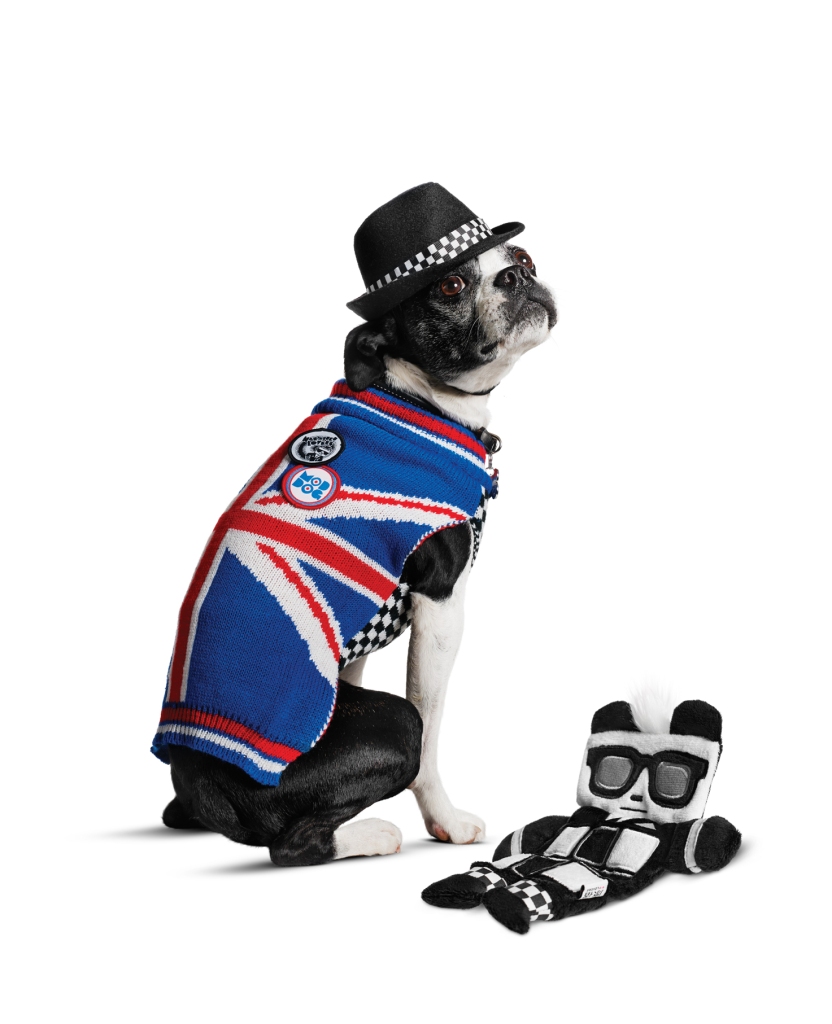

Comentários
Postar um comentário